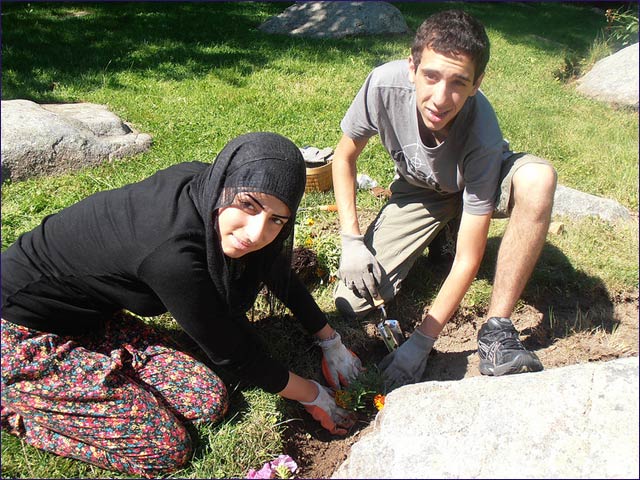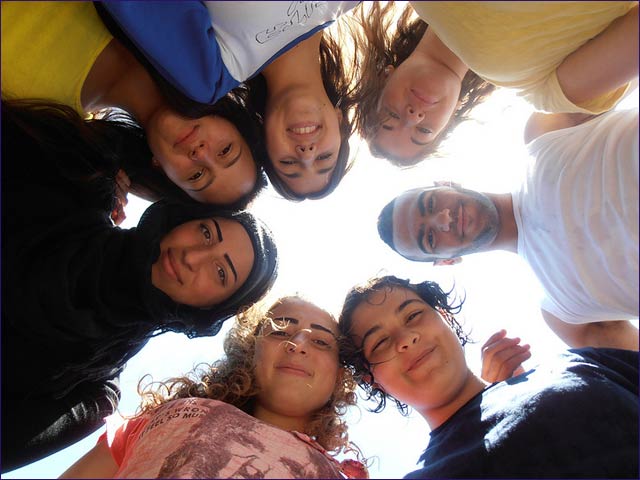By Avigayil Kadesh
Last summer, 36 high school students and teachers from Israel – Jewish and Muslim -- flew to New England to spend two intense weeks volunteering together, playing together and above all living, cooking and cleaning together 24/7.
“I learned a lot about myself and about how I can adapt in a group of people I don’t know and don’t have a lot in common with,” says Noam Meir, one of five participants from the Leo Baeck Educational Center in Haifa.
“It was life-changing,” she says. “I have a different outlook now. Before, I didn’t really understand Arab people. We don’t live together and I didn’t have plans to get to know them. Now I will come with a more open mind to different people and also I will try to tell my friends the same.”
The experience was an outgrowth of a project begun in 1986 by a youth worker and his Rotary Club in Portsmouth, New Hampshire, designed to get Catholic and Protestant teen leaders from Northern Ireland talking on neutral turf. Now one of Rotary International’s most successful projects, Friends Forever expanded to encompass Israeli delegations five years ago.
The Rotary Club in Haifa sponsored the Leo Baeck group and their peers from Ein Mahel, both in northern Israel.
“It was the second time for our school,” says Naama Nagar, a psychology and mass communications teacher chosen to accompany the group along with Fuad Habib-allah from Ein Mahel, which sends another annual group with kids from a school near Eilat. “To me, the main goal was to have them become friends, to realize that people from different religious and cultural backgrounds could be friends.”
Based on teacher recommendations and personal interviews, the Leo Baeck staff chose five students who demonstrated exceptional leadership skills and open-mindedness, says Nagar.
How to speak to each other?
Along with their Friends Forever site manager, the Israeli teachers and kids were based in a loaned house and toured Cape Cod, Denver, Boston, Gloucester and a Native American site. They volunteered in a hospital, visited a mosque and a synagogue, spoke at local Rotary Clubs and did trust-building activities such as a ropes course.
“Before, I never really met [Arab teens] or stayed with them in the same room, and now I know it is possible,” says Guy Shilo. “The first day it was awkward, but then we started getting to know each other.”
It’s easier for Irish Friends Forever teens to bond, because despite their ideological differences they share the same language. For the Israeli group of six girls and four boys, the language barrier was a major obstacle.
“When we speak Hebrew they can understand, but not well, and when they speak Arabic we cannot understand them at all,” explains Guy, who now would like to learn Arabic.
Over the course of three preliminary ice-breaking meetings between the students, they agreed to communicate in English – a language they all know, but obviously not as well as their native tongues.
“We had to decide to speak English in order to work and live together,” says Nagar.
A new comfort zone
“At the beginning, it was hard for the children to step out of their comfort zone,” Nagar observes. “It wasn’t like a school trip where you can hang out with your friends. But we encouraged them to talk about their cultural and religious lives, what they have in common and what is different between them. By the time they got on the airplane they were already more comfortable together.”
Daniel Mordechai adds, “It sounds surprising, but after a meeting or two, I realized they are just like us and I felt very comfortable with them.”
 A Muslim girl and a Jewish boy gardening together
A Muslim girl and a Jewish boy gardening together
Both Guy and Daniel mentioned the mosque visit as one of the high points of their adventure. Neither had ever been inside an Islamic house of worship before. Nagar says the Jewish girls in the group chose to put on head coverings for the visit. “It was very respectful of them to do, I think.''
The teens said their parents all encouraged them to be part of Friends Forever. “My parents convinced me to go,” says Daniel. “They said it would be a very unusual opportunity to meet the Arab population because in everyday life there is a distance between us.”
All of them now stay in contact through Facebook, and anticipate several face-to-face meetings during this school year.
“We will be going to each other’s schools and having activities together, even just going to movies together or eating together, which is even more important,” says Nagar. “This is what really builds the connections.”

Will they be forever friends? They are not required to do any public speaking, but all ten ran a workshop for fellow sophomores.
“We chose children with leadership skills because we want them to take this life-changing experience and deliver it to their friends and families -- to be the ambassadors,” concludes Nagar.